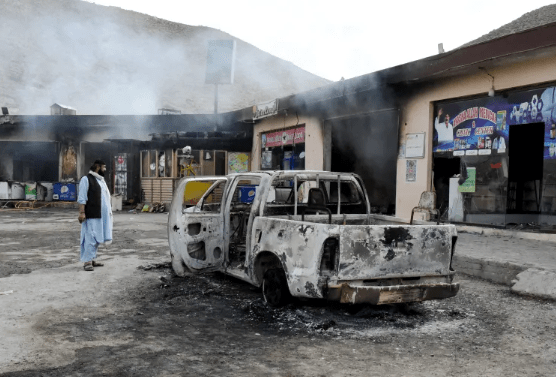
Islamabad, Pakistan – At least six fighters and four security officials have been killed in an overnight attack in Pakistan’s southwestern Balochistan province.
Jan Achakzai, the provincial information minister, on Tuesday said the attackers, belonging to the Balochistan Liberation Army (BLA), targeted military and security installations with guns and rockets in the city of Mach, 65km (40 miles) south of Balochistan’s capital, Quetta.
As they faced resistance, the attackers moved to “less secure” areas, focusing their assault on the Mach police station, an official told Al Jazeera on condition of anonymity since he was not authorised to speak with the media.
“At the moment, a clearing operation is under way in the suburbs of the city,” he said. “The terrain here is quite difficult, but we are hopeful to wrap it up by the end of the day.”
In a statement shared with Al Jazeera, the BLA claimed the responsibility for the attack, saying its “freedom fighters” conducted the operation.
BLA is a banned armed group that is part of a broader rebellion in Balochistan, Pakistan’s largest and least populated province, which borders Iran and Afghanistan. The province is also the country’s poorest despite being rich in mineral resources and vast reserves of natural gas.
Shuja Kasi, the inspector general for prisons in Balochistan, said the attack caused minor damage to the police station and the adjoining prison, where, he said, 800 inmates, including 90 on death row, were safe.
“There was some damage to the doors and windows were broken while some staff quarters used by officials were mildly damaged,” he told Al Jazeera.
Mach resident Iqbal Yousufzai said a large explosion occurred around 9pm (16:00 GMT) on Monday, followed by gunfire lasting for nearly 12 hours.
“The explosion damaged windows of my house. After that, firing started and intermittently went on till at least 8am on Tuesday morning,” he said.
The decades-old rebel movement in Balochistan accuses the Pakistani government of neglecting its residents and unfair distribution of resources.
The rebellion has seen several attacks on Pakistani security forces and Chinese citizens working in the province on the $60bn China-Pakistan Economic Corridor (CPEC), triggering a forceful response from the Pakistani state.
Allegations of human rights abuses, including extrajudicial killings and disappearances of ethnic Baloch individuals suspected of supporting the rebellion, have been frequently made against the security forces.
The attack came amid heightened global attention on Balochistan following an Iranian air strike and a month-long sit-in held by Baloch people in the capital Islamabad.
Last month, Iranian forces struck inside Pakistani territory, killing at least two children on the outskirts of Panjgur city in Balochistan. Iran said its attack targeted another armed group, Jaish al-Adl, based in the province.
Pakistan launched a retaliatory attack two days later, killing at least nine people described by the Iranian media as “non-Iranians”. Islamabad said its response was based on “credible intelligence” that some armed groups had been given sanctuary in Iran.
The Baloch protest in Islamabad followed the killing of a young man who state officials claimed was a rebel – a charge denied by his family. After their protests in Balochistan failed to meet their demands, the Baloch protesters made their way to Islamabad in December for a weeks-long sit-in.
As Pakistan prepares for its general election on February 8, security analysts caution that Baloch separatists have already denounced the polls.
“The Baloch secessionists remain the only faction that has continuously targeted election campaigns and party meetings, but the scope of these attacks has not gone beyond corner meetings and election offices,” analyst Iftikhar Firdous told Al Jazeera.
Firdous, the founding editor for The Khorasan Diary, a news and research portal that tracks and analyses security issues in the region, said the timing of the attack is the “more interesting part of the optics”.
“The BLA attack in Pakistan seems to indicate that while countries will try their best to maintain diplomatic subtlety in their demeanour, the action at the borders will determine the future course of the conflict,” Firdous said.








